I gave a talk on Bryan Johnson's scam story at a Longevity conference
The Doctors, Longevity researchers and Biohackers weren't expecting this...
Just recently in California, I gave two presentations at a longevity event. My first talk was on testosterone and the second one focused entirely on Bryan Johnson and the impact he is going to have on the longevity space.
You can catch the full presentation in the above video. Make sure to read the rest of this post after you watch the video as I give some important context to this whole project.
What makes a Scam?
Let me note first that I do not use the word “scam” lightly. If someone misspeaks on a podcast, gets some data wrong or forgets the exact milligram amount of a particular compound in their product, that doesn’t mean they’re running “a dishonest scheme.” However, when there’s a consistent pattern of dishonesty is when something becomes a contender for the title of “scam.”
Watch the attached video until the end, and let me know:
Do you think “scam” is an appropriate word for Bryan Johnson’s story?
So, why Bryan Johnson? Why the laser focus on one guy?
It’s been a while since I’ve posted here on Substack. I’ve gotten a couple messages asking why my WIL Weekly suddenly stopped completely.
As you may have noticed, I did a 30 day series on investigating whether Bryan Johnson’s story is a scam. For those of you not familiar, Bryan Johnson is a tech millionaire who has been allegedly spending $2 million dollars a year to ‘live forever.’ He has done all kinds of niche and unique therapies that gained plenty of attention from traditional media and has allowed him to go viral on social media. He even had his own Netflix documentary released this January.
One of the key reasons for his explosion in popularity is his story. He and his cofounder have talked about the power of storytelling on multiple occasions. Here is the Bryan Johnson story so far:
(0) Bryan was gripped by the sadness of poverty in Ecuador when he was a missionary.
(1) His goal became to get rich and then help the world with his resources.
(2) Bryan sold his company and became a centi-millionaire.
(3) He was sick and depressed and realized that allowing his mind to be in control was not working for him.
(4) He started working on an ‘algorithm’ to achieve perfect mental, physical and spiritual health.
(5) He gathered a team of 30 medical experts who went through all the longevity research.
(6) His rigorous, $2M routine lead him to becoming the most measured man on the planet.
(7) His Blueprint protocol took form.
(8) He started to rack up health achievements that indicated he was truly becoming younger thanks to the protocol.
(9) So many people wanted the protocol, so he made it easy for them to do it by launching his own product line.*
(10) His protocol kept working → He then achieved the ‘best’ biomarkers on the planet and is now the ‘healthiest’ person on the planet.
*Notice that the implication is that he did not do this for money: (1) he’s already rich (2) he just wants to help the planet per his Ecuador experience (3) the reason for product-itizing his protocol was to make it easy for people to do.
This nice and neat character story arc makes Bryan a very compelling protagonist.
However, as I started to dig into this, I quickly learned that this story has been cobbled together with half-truths, unsupported claims and straight up deception. I encourage you to watch all of the videos in the ‘is Bryan Johnson’s story a scam?’ series if you think I’m surely exaggerating.
So, why now? Why Bryan Johnson?
After 7 years and 100+ long form videos on my What I’ve Learned channel, I’ve never done a take down video of anybody. You can go through everything on the channel and won’t find a video that is entirely about criticizing just one person. My bar for using my platform(s) to publicly criticize someone is very high.
However, Bryan somehow managed to be the amalgam of many topics I’ve spoken about critically - all wrapped up into one person. Not unlike the way the planeteers combine their powers to summon Captain Planet.
Doublespeak, How to Lie without Lying.
In this video, I looked at all the different ways people make use of language to (a) mislead or deceive others, (b) distract from truth or (c) or embellish the truth. The best deception is often subtle and often relies on taking advantage of the good nature of the average person. It’s not our default to assume someone is lying or trying to trick us. We usually take most things at face value and if we don’t understand something we assume it’s something we missed, not that the other person is playing a smoke and mirrors game. This is something Bryan often takes advantage of, as I laid out in video 10 of 30 .
Lab Meat. The $1 Trillion Ugly Truth
In this year old video, I lay out the fact the science simply and straightforwardly shows that ‘lab meat’ will never be practical. A stainless steel bioreactor that is just a tank of cells floating in fluid can never compete with the efficiency of an organism that arose as the result of billions of years of evolution. Yes, lab meat exists. It’s just going to be 100-1000x the price of normal meat meaning it won’t be anything more than a novelty for rich people. How did lab meat ever get so much investment if it’s a total pipedream? Because people were willing to unabashedly hype up where the science currently is to mislead investors into giving them a lot of cash. After that, it was all momentum. Other investors saw this and didn’t want to miss out so they decided to invest too.
This is exactly what I’m reminded of when Bryan says things like “this is the first time in human history you can say with a straight face you may not die.” This is all hype. What has happened lately? Did scientists make a model organism immortal in the lab recently? No. Are there any Nobel prizes in longevity that we didn’t hear about? No.
Some might say that it’s a reasonable idea considering we’re on the verge of the AI singularity and omnipotent superintelligence. First, show me one instance of AI (or insights from AI) making any organism immortal in the lab. Second, you might as well say that we are on the verge of ‘magic.’ Sure, big things are coming with AI, but you can’t just run with ‘anything is possible.’ Just because AI is rapidly evolving doesn’t mean that superintelligence is going to allow Voldemort to achieve immortality through Horcruxes.
True or not, these over-the-top claims drives hype and in turn drives supplement sales.
Vegan diets don’t work. Here’s why
If you’ve seen a couple videos from my main channel, you’ve probably realized I think animal foods are very important for growth, development and health in general. I even made a video directly criticizing the vegan diet.
As I laid out in a short video on my Joseph Everett channel: The Scam Science behind Bryan Johnson’s $2M Diet, I never really thought to criticize Bryan’s Blueprint protocol for being vegan because he had always said it was simply “by choice.” Then, he posted a tweet this year saying that actually, there is a lot of science supporting the lack of red meat in his diet. Specifically, that red meat would reduce longevity. He posted tons of papers to support his argument.
Now that he was saying that the vegan aspect of Blueprint wasn’t “by choice” but was ‘backed by science,’ I felt very compelled to see just what kind of science he was using to justify his claims. If you take a look at that short video I made, you’ll see me lay out just how embarrassingly weak the studies he posted are. Just this by itself made me question just how solid Blueprint really was.
This might seem harsh, but this isn’t just any influencer. Bryan is supposed to have an expensive team of thirty medical professionals … but this is the caliber of scientific reasoning hat they’re producing? The lack of scientific rigor here really raised an eyebrow and got me to be curious about the validity of his other claims.
I could point out several other videos like my Why you Shouldn’t Rely on Supplements or my Why is Nutrition Science so Complicated, but overall, the years of investigation and research in this space has made it very easy to spot the holes in Bryan’s story.
I could go on, but at the end of the day, why is this important to you?
Who cares?
Most of my research is guided by my curiosity, but I do try and narrow my focus down to things that can actually be useful to the people watching/reading my content.
At the start of the above talk, I asked how many people knew of Bryan Johnson. Everyone raised their hand. I then asked how many of them had seen my Instagram reels or Youtube shorts investigating Bryan Johnson’s story. Maybe 4 people raised their hands. I was pretty nervous about how it would be received after that, but the big round of applause at the end suggested everyone really liked the talk. I even got a couple woo!’s and whistles.
In the talk, I basically broke down how practically all of Bryan’s Johnson’s health ‘achievements’ were either straight up misleading or not what they seemed to be.
In the talk, I laid out why this topic is important:
・Bryan Johnson is essentially the ‘mascot’ of longevity right now.
・He is on track to be the best known health influencer but is certainly the fastest growing health influencer.
・This means he has a lot of influence over the average person who is new to this space. Longevity and the science behind what makes us ‘healthy’ is incredibly complicated with so many people providing conflicting logic, studies and justification for their approach to health. People pay attention when someone like Bryan appears with a great, easy-to-understand story. As a rule of thumb for how to be healthy, why wouldn’t you just go ahead and do what the person with the ‘best biomarkers in the world’ does?
・The longevity conference all about great minds coming together and discussing how we can realistically achieve longevity escape velocity if not live dramatically longer. This is most certainly going to require playing the long game. If you want to play the long game, you need to be rooted in truth and build a foundation of trust. Deceiving people will work in the short term, but it’s not going to last and it certainly won’t last 20, 50, 100, 200 years.
・I personally love n=1 experiments. They’re interesting and may point us in the direction of where to focus our research and experiments next. If you go back on this Substack, you’ll find me mentioning that I was genuinely interested in seeing where Bryan Johnson’s experiment would go.
I like doing n=1 experiments myself and one of my favorite talks at this conference was Goktug Yilmaz’s on his experiments in increasing Heart Rate Variability. Bryan n=1 experiment is easily the best-known one at the moment. When people find out about the ways he has mislead people and hid data (despite saying on many many occasions that he shares all his data and is totally transparent), it will leave a sour taste in people’s mouth and hinder future explorations.
・At the end of the day, people are ending up paying their money on the Blueprint products due to Bryan’s compelling story. So I suppose the maximally practical question is ‘are the products any good?’ Well, as I laid out in Day 25 of the series, Bryan still hasn’t shared the data that might answer that question. He promised to release the full data set from a study with thousands of participants (who each had to pay $2000 to participate) designed to assess the effectiveness of the Blueprint stack. The study was completed, and the data is in Bryan’s hands …but we’ll soon come up on a year of him not sharing the data on side effects, extent of benefits, extend of detriments etc.
P.S.
While it’s easily less than 0.1% of the comments across Instagram and Youtube, I do see a couple comments saying that it’s so weird to make 30 days of content on one thing, especially one person. I understand the optics of continuous posting, but the reality is this isn’t too different from my usual process. I try and go as thorough as possible on each topic and often spend a month plus on the research process for each video. The only difference now is you’re seeing it spaced out into 30 days of posts rather than all wrapped up in one big video posted once. Actually, these 30 days of shorts is only about 60% of the content.

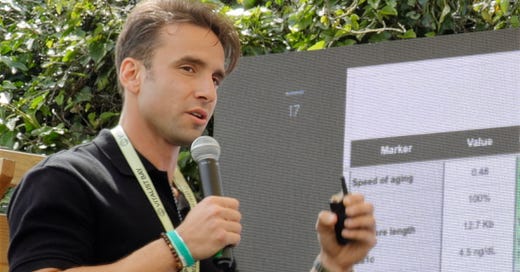



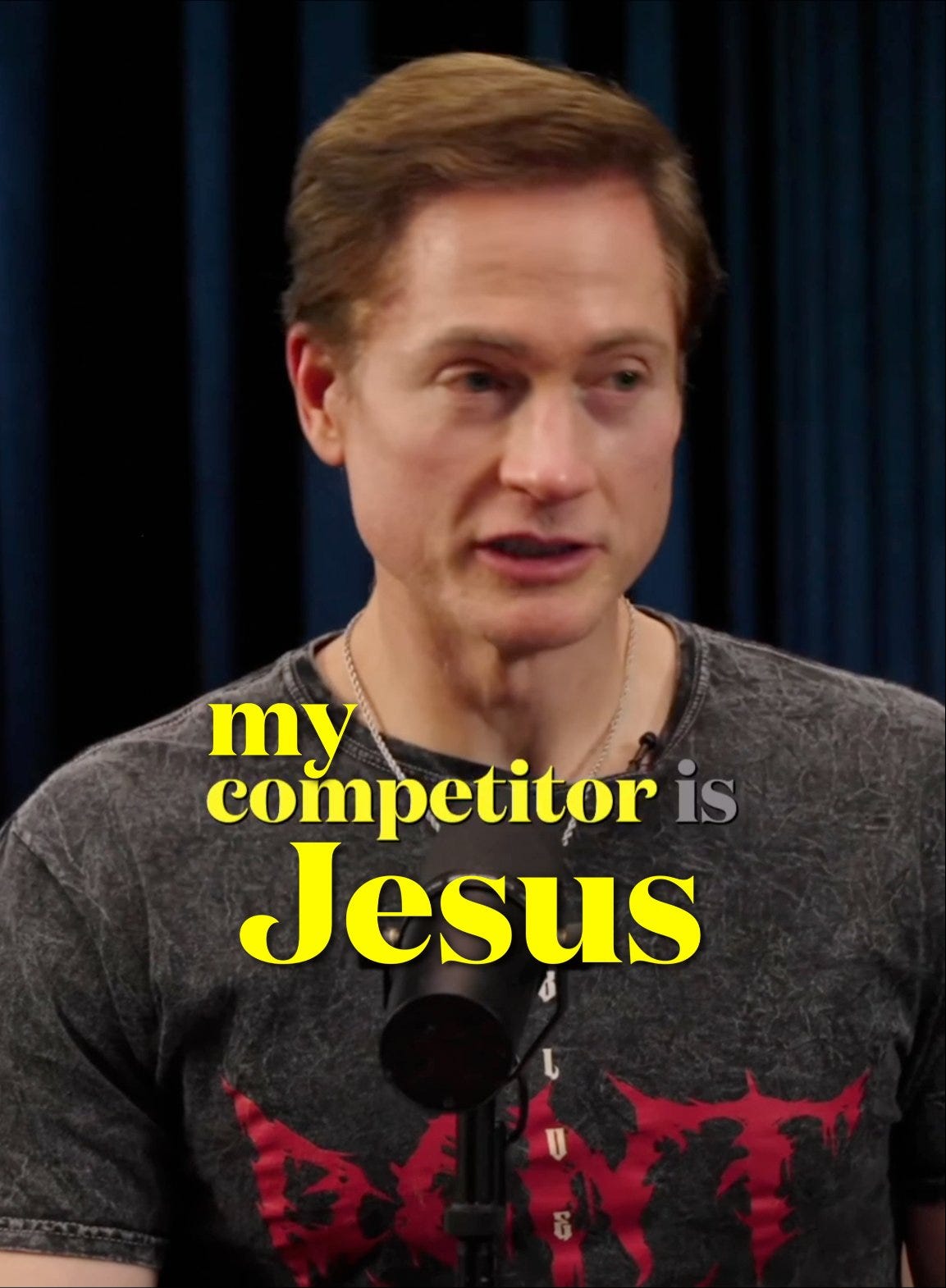

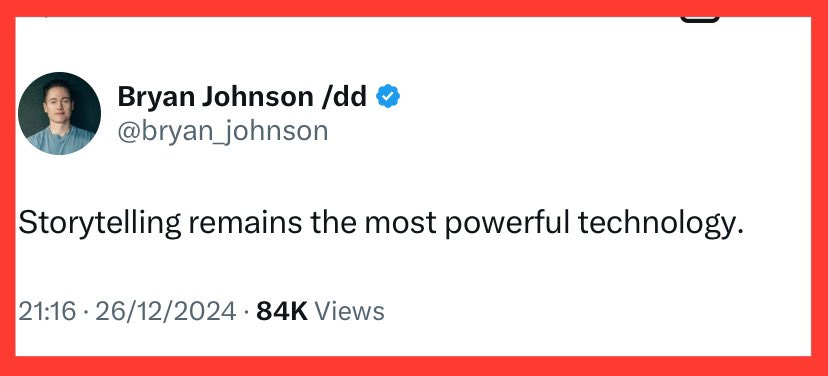



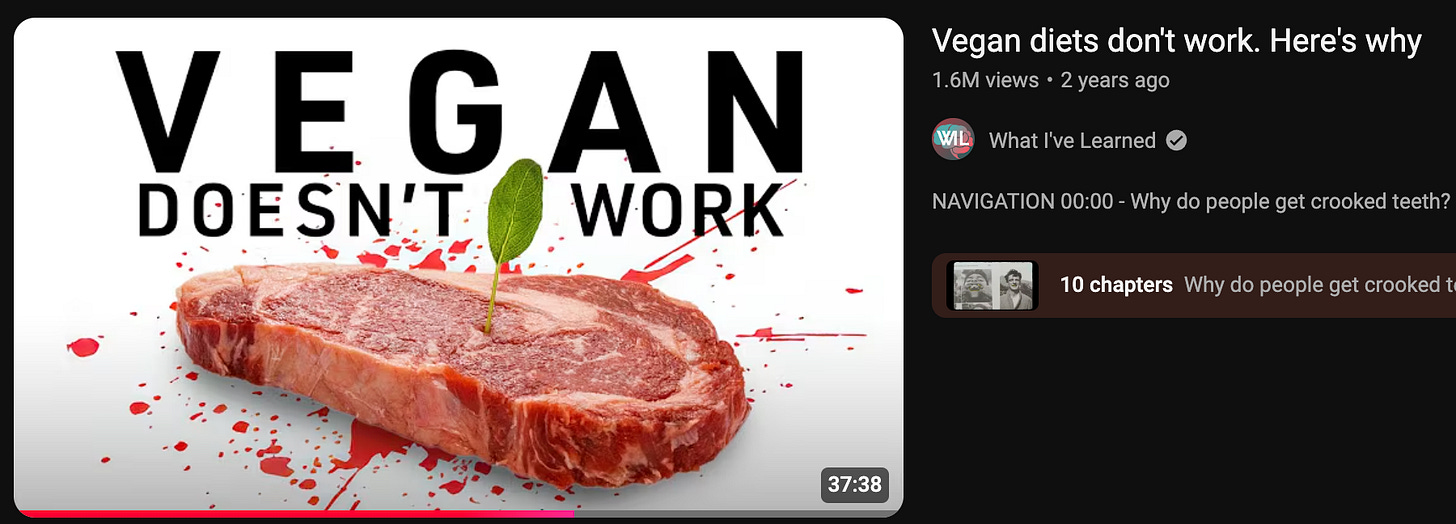


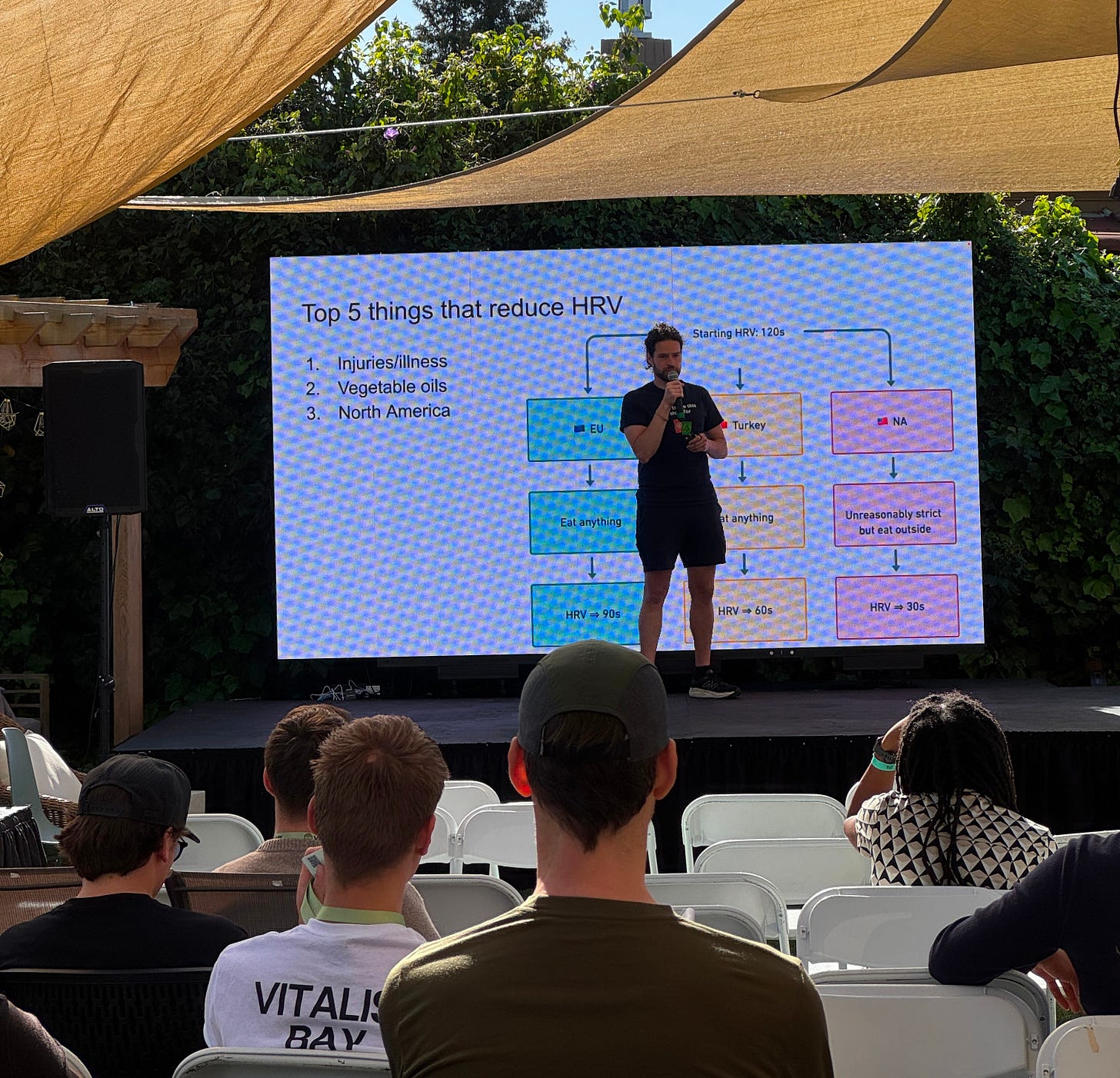
Hey, Joseph, I'd like to start contributing to your work soon. Which method of payment leaves you with the highest slice of the pie, Substack, Patreon, Youtube memberships, direct Paypal transfer?
Hey Joseph, this like if someone in the 70s was debunking the food pyramid and the diet–heart hypothesis in real time. Imagine how many lifes could be saved if they had internet and had people like you back then.
What's interesting that Bryan Johnson, especially if you watch Ordinary Things channel interview with him, seems really down to earth, open and honest in his pursuit. Yet at the same time, as you're proving with your series it's obvious that he is providing false information and even outright scamming people.
The fascinating this about this is actually his psychology in all this. It doesn't 100% feels like hes just a completely conscious scammer.
It feels as if he's drinking his own Kool-aid, as if he was somehow scamming himself as well...